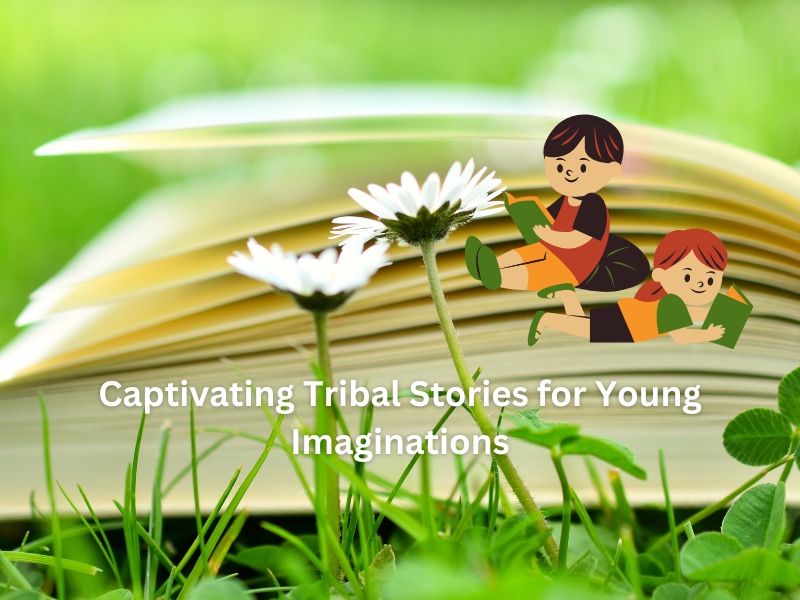India is a country with diverse tribal cultures. Each of these tribal groups has their own unique captivating tribal stories to tell. These stories have long captivated the imaginations of both children and adults. It offers a glimpse into rich cultural traditions, timeless wisdom, and fantastical adventures. In this article, we dive into the enchanting world of tribal storytelling and explore its significance in nurturing cultural appreciation and stimulating young imaginations. Each captivating story serves as a gateway to exploring diverse cultures, imparting moral lessons, and igniting a sense of wonder and curiosity in young readers.
The Power of Oral Tradition: Passing Down Ancient Wisdom
The power of oral tradition lies in its ability to pass down ancient wisdom from one generation to the next. Tribal stories, deeply rooted in oral tradition, have been shared and cherished for centuries. Through the oral transmission of these tales, indigenous communities have preserved their cultural heritage. Besides, they ensure that their ancestors’ wisdom, values, and beliefs endure. The act of storytelling itself fosters a sense of continuity. Further, it connects present-day listeners with the past and forging a link between generations. As the community shares and retells the stories, they breathe life into the collective experiences and knowledge, turning them into a living testament.
The oral tradition of tribal stories is a testament to the strength and resilience of indigenous cultures. In addition, they remind us of storytelling’s profound impact on preserving and celebrating our shared human history. Therefore, we must continue to recognize and appreciate the power of oral tradition in passing down ancient wisdom and maintaining the cultural fabric of indigenous communities.
Cultural Appreciation and Respect for Diversity
Transferring the goodness of human heritage is a responsibility. Through tribal stories, children develop an appreciation for diverse cultures and a deep respect for the customs, traditions, and values of different indigenous communities. These stories celebrate cultural diversity, promoting inclusivity and empathy towards others. These stories serve as powerful tools for promoting inclusivity. Furthermore, it teaches children to embrace diversity and value the unique contributions of every culture they encounter.
Imagination and Creativity Unleashed
With every turn of the page, tribal stories kindle the flames of imagination. It invites young readers to embark on awe-inspiring adventures alongside their favourite characters. These tales ignite a sense of wonder and curiosity, allowing children to create their own magical worlds where anything is possible. Through vivid imagery and enchanting narratives, children are encouraged to unleash their creativity. It helps in crafting their own stories and expanding their imaginative potential. The power of tribal stories lies in their ability to transport young minds to mystical realms, where mythical creatures, heroic quests, and daring adventures await, inspiring a lifelong love for storytelling and imaginative exploration.
Connection with Nature and the Environment
Many tribal stories emphasize the interconnectedness between humans and the natural world. Through these tales, children learn the importance of respecting and preserving the environment, fostering a sense of stewardship for the planet. Children should learn to love the nature and environment. These captivating tribal stories intimately connect with mother nature, forming a close bond that transcends time and generations. Therefore, it helps to build the connection.
Lessons of Courage, Resilience, and Empathy
Through the protagonists of tribal stories, children witness the transformative power of resilience, courage, and empathy. They learn that even hard challenges can be overcome with effort. Furthermore, kindness and understanding have the ability to heal and bring people together. These tales serve as guiding lights, imparting valuable life lessons that inspire children to navigate their own journeys with resilience, compassion, and a deeper understanding of themselves and others.
Exploration of Moral Values and Ethical Dilemmas
Within tribal stories, moral values take centre stage as young readers are presented with thought-provoking ethical dilemmas. These narratives serve as catalysts for critical thinking and reflection. Thus encouraging children to examine their own beliefs and values. Through these discussions, children develop their own moral compass, learning to make informed decisions and navigate the complexities of right and wrong in their own lives.
Cultural Identity and Self-Reflection
Through the familiar themes and cultural elements present in tribal stories, children from indigenous backgrounds find a mirror that reflects their own cultural identity. It allows them to see themselves and their heritage represented. This connection fosters a deep sense of pride, belonging, and validation. As a result, it empowers them to embrace and celebrate their cultural roots with confidence and joy. By immersing themselves in these stories, children forge a stronger bond with their cultural heritage. It helps in carrying it forward and ensuring its preservation for future generations.
Family Bonding and Intergenerational Connections
Tribal stories often bridge generational gaps, providing opportunities for family bonding and intergenerational connections. Shared storytelling experiences create lasting memories and strengthen familial ties. Storytelling is an art. It was an inevitable part of raising children. But now, somehow it vanishes from the families. Stories not only teach values but also strengthens family bonds.
Inspiring Cultural Preservation and Appreciation
On the whole, tribal stories serve as guardians of indigenous cultures. It ensures that the heritage and traditions of communities are not lost to time. Through the sharing and retelling of these stories, future generations gain invaluable insights into their cultural roots, fostering a deep appreciation for their heritage. By instilling a sense of cultural preservation and appreciation in children, tribal stories become a powerful vehicle for cultural continuity, passing down the wisdom and values of indigenous cultures to shape the identity of generations to come.
Conclusion
In conclusion, captivating tribal stories have an enduring appeal that transcends time and cultural boundaries. Through these tales, young readers embark on immersive adventures, learning about diverse cultures, and developing valuable life skills. Tribal stories nurture cultural appreciation, ignite imaginations, and foster empathy and understanding. By introducing children to these enchanting narratives, we inspire a new generation to cherish and protect our collective cultural heritage. Therefore, let us continue to celebrate and share these captivating tribal stories, knowing that they hold the power to shape young imaginations and create a more culturally diverse and empathetic world.

